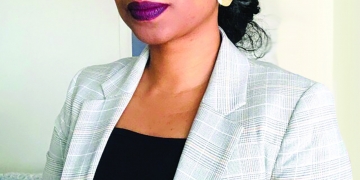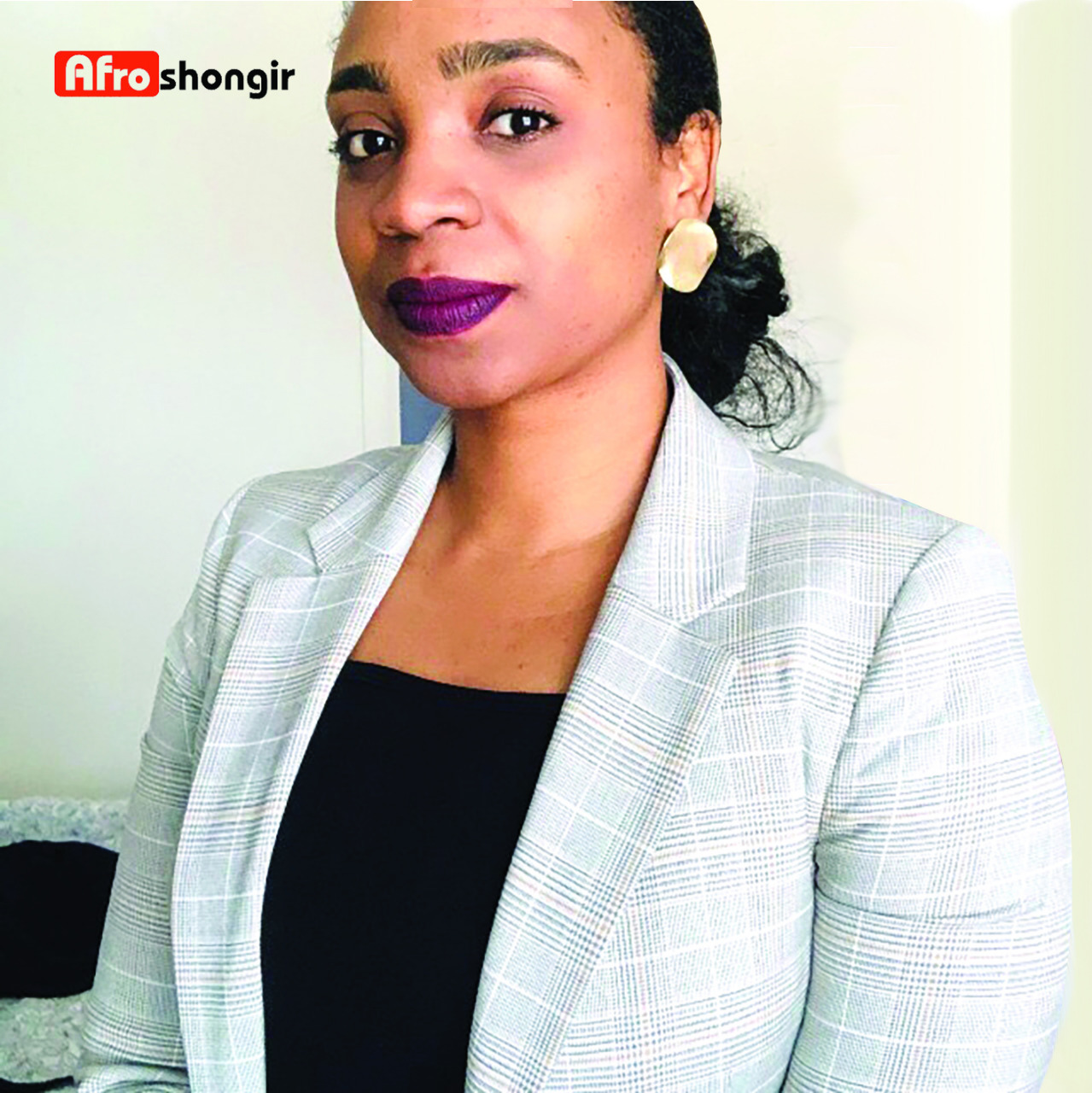
Stockholm: Mohammad Fathi
The past year was gathering to an end, when the scientific march of the Sudanese student Sarah Abu Sagra took a pivotal turn featuring a totally different change to her. The young lady who made her way to early entrepreneurship since high school, her university education did not divert her from her dream, but this time she wanted to take knowledge economy as a different starting platform. The genius who rose to the top place via the fierce competition at the University of al- Ahfad , won the award of the best university graduate. Soon she left for Europe, to study for a master’s degree, to find there a stimulating environment for creativity and innovation waiting for her.
Sarah despite the early steps she took since the secondary stage in the business market, with a small project on designing accessories and women’s fashion with the support of her family, but her true story with entrepreneurship started after she deposited in the Library of the Al -Ahfad University a research project on “microfinance for small and medium projects for young people’s projects” .
She received an honor degree from the Faculty of Administrative Sciences at the University in the Bachelor’s Degree in 2009, to establish 3 years after her graduation, a microfinance organization for needy families in the name of “donations”, to become an incubator that effectively contributed to the launch a number of small projects in a short time. After she succeeded ,as the owner the organization “donations” in providing logistical support by collecting donations from co-workers, and creating twinning with other organizations.”
After a 10-year hiatus, Sarah’s returned to her academic studies, to get back once more to continue her passion for creating success stories in the university campuses by enrolling at the University of Medical Sciences (Mamoun Hummaida , and to obtain an MBA on project management on the specialization of projects management in April of the year 2019.
On August of the year 2019, Sarah Abbas Abu Sagra drew another dimension of her educational career, shifting her interest from entrepreneurship to knowledge economics. Abu Sagra says that her entry into the world of innovation was an inevitable step after joining the classes of masters students at Umeå University in Sweden. This was due to the nature of her study of strategies science planning and business development. The birth of her first project was with a group of masters’ students from various international universities. The project was an innovation and manufacture of satellites to study the indicators of wildfires. The project won the second place. Sarah explains that the project was based on the indicators of the SDGs, which are currently considered the basis for all actions on the environmental level, and link them directly to all aspects of life, including the diversity in the indicators themselves, starting from developing human life, approaching water and forests and finally to the climate in an integrated form.
Abu Sagra did not stuck there, for her yearning of innovation cannot be satisfied by one success, her dream extends over the horizon of the world of innovations. She was eager to reap many of them, so she embarked on another project, which is the second project she launched together in co-operation with a group of her colleagues. They won the Innovation award at Umeå University. Abu Sagra says that the project also serves the issue of “environmental sustainability” SDGs, as the focus has been on developing a manufacturing method which consumes less energy and zero waste production and the project addressed the use of 3D printing technology in the manufacture of shipping crane with the support of the Swedish company( Macgregor) working in the field.
She indicates that the two projects have tangible economic benefits, as both projects contribute to reducing resource consumption and increasing profitability, which in turn contributes to raising levels of production and individual and institutional income.
It seems that the creativity and innovation environment there allowed Sarah more prospects towards global competitiveness in the knowledge economy. She also participates in a new project that was proposed by the Swedish government in partnership with DIGG, Hack for Sweden and Open Hack, which is a competition proposed to come up with innovations and solutions that help the world as a whole and Sweden in particular to overcome the crisis of Corona COVID 19 and lays strategies to manage post-crisis situations.
Sarah explains that the hardest obstacles facing the innovator are the lack of entities that provide administrative guidance to the innovator firstly and material support secondly, indicating that the actuality of her experience in Sudan has been an inspiration to her, as the rate of need for young projects was very high, according to her observation of the pace of daily life of the Sudanese citizen and the size of the tribulation an innovator to obtain the simplest services , the permittivity of some products and the size of the large consumption of resources resulting from the low level of awareness of the business owners. But, as she says, her notifications were no more than modest ideas to harness the little available to come up with innovations that help to manage life more effectively.
She says: “I have always faced many obstacles, starting with the availability of capital and arbitrary procedures required to obtain bank financing, and then I used to collide with the amount of costly government requirements, which still consume a lengthy period of time ranging from months to years, sometimes.”
The role that these bodies play is fundamental according to what they provide, or as we call them incubating. Such startups, as they carry out the renewal and development of the nature of business and the making of a specific shift in the economy of countries that adopt this type of business. “
Answering our question about the advantages of projects producing goods that have patency from the manufacturing source on other goods, says Abu Sagra, “The copyrights and patenting are considered means to protect innovations from counterfeiting and theft. Projects that obtain these features have a highly competitive requirements, which contributes to improving the product and the process of continuous development. ” However, she added, “But it is also worth noting that these features or certificates have a negative role in some cases, as they limit the development of the idea by other parties capable of adding and developing, due to the inability of these agencies to penetrate these licenses under the law
Statistics also showed that companies pay huge sums of money to renew these licenses periodically. These licenses have a time period of up to twenty years. You can imagine the impact of this long period on the development process compared to the high acceleration in the global invention market. ”
Regarding the reality of the environment of creativity and innovation globally and locally, Abu Sagra sees that these days the world as a whole has moved towards encouraging and financing startups and dealing with them as a basis for future economic development, but the situation in Sudan is very different, she said, there is no orientation for the state towards this type of economy, because the state still insists on relying on reinter economy, and Sarah sees that if the competent authorities in Sudan want to achieve a real homeland rise, it should adopt the knowledge economy as a lifeline from further economic decline, and apply generous support to the scientific research, with the need to establish incubators’ technology, embrace innovative projects and inventions, with good management and good governance to penetrate the most notorious global markets, with all firmness, which plays a pivotal role.
Abu Sagra added, “A number of incubators have appeared in Sudan, but they are shy attempts, as they lack direct support from scientific institutions, government and private institutions .” “Sudan is a country full of youth energies that lack only direct guidance, adequate support and awareness of the authorities. Influencing their role in moving the wheel of economic development for Sudan. “
“
At the end of her talk to “afroshongir”, Abu Sagra presented recipe of success to the innovators and inventors in Sudan, and recommended them to provide themselves by abundant amount of optimism and always to seek to take challenges and believe in themselves, as she believes that any problem is an opportunity to invent creative solutions, by exerting effort and seeking knowledge.
She added, “I am confident that we in Sudan, as young people, enjoy many advantages, and we can change the course of things and transfer the state to be in the ranks of developed countries. Waiting is the biggest problem and what I mean here is not to wait for opportunities to come, but we must hunt opportunities and harness all conditions to serve our goals.” Let our suffering in the shadow of the anguish of the last thirty years be a additive provision for us and the revolution we have accomplished and a source of strength and confidence.















